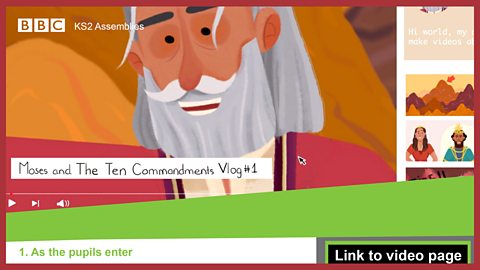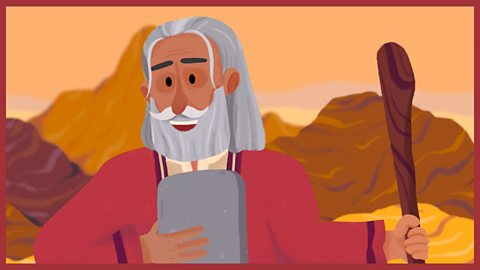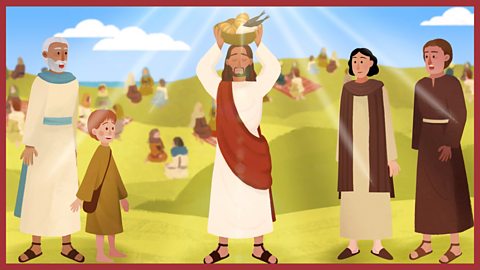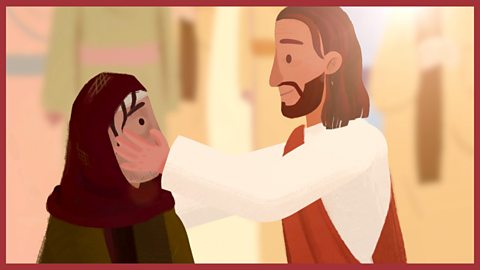Themes: Rules; rights and responsibilities; consequences of actions; Moses.
Summary: The story of Moses and the 10 Commandments is from Exodus 20: 1 - 17. According to the Bible, Moses led the Jewish people out of slavery in Egypt towards the Promised Land. When they had arrived at Mount Sinai God spoke to Moses and Moses received the torah - usually translated as law. The best-known of these commandments are the Ten Commandments - but their are actually 613 of them, covering all aspects of life.
Resources: the assembly to download / print (pdf); an image of from the video. Additionally, four volunteers to play a game called 'Consequences'.

The video
The Bible story of Moses and the 10 Commandments is retold - with a twist.
Moses and the Jewish people are on their journey from Egypt to the Promised Land when Moses goes to speak with God near the summit of Mount Sinai. Afterwards Moses relates what happened in his most recent vlog to his channel. He says that God gave him ten commandments - or rules to live by - written on stone tablets. Moses describes each of the commandments in turn and goes on to reveal that God actually gave him 613 commandments so there are still another 603 to vlog about!
Duration: 4' 44:
Final words: '… 603 to go! Peace out!'
Video questions
- How long does Moses say he was on Mount Sinai talking with God ('Forty days and forty nights')
- What is the first commandment - or 'Top Tip 1'? (Do not worship any other god - just God)
- What was Tip 5? (Respect your parents)
- What is the final tip that Moses relates - Tip 10? (Do not get envious of your neighbour's house)
- How many 'Top Tips' does Moses say God has given him in total? (613)

Key links
Download / print the assembly framework ready for use

Click to display the image full-size


Suggested framework
1. Entry
Play suitable music as everyone enters. A possible suggestion is 'In the Hall of the Mountain King' by Edvard Grieg.
2. Introduction
Ask what everyone thinks about rules. Do they think rules are needed, or are they just annoying and get in the way? (Take suggestions of rules that we are expected to follow: at school, at home, at work, when playing football, in government meetings, or in shops. Discuss how important (or not) the rules are, and why.)
What might happen if we do not follow the rules? (Take suggestions.)
Explain that lots of religions have rules to follow, and Judaism and Christianity are no exception. The Bible tells a story of a man called Moses (they may have heard of him in Egypt with the plagues and the parting of the Red Sea). When Moses was leading his people to live in their new land, he walked up to the top of a mountain and came down with a new set of rules from God for them to all follow. These are known as the Ten Commandments.
Explain that the short video they are now going to watch imagines what it would have been like if Moses vlogged about his meeting with God and posted the video to his social media channel.
3. The video
Play the video. The duration is 4' 44" and the final words are: '… 603 to go! Peace out!'
4. After the video
- Ask everyone to turn to their partner and try and remember as many of the 10 Commandments as they can. Write them down and stick them up at the front.
- Explain that rules are created for many reasons, but one reason is to protect people from getting hurt. Which ones might this apply to? Can they think of any other rules either in school or out of school that are written to protect us from getting hurt?
- Introduce the word CONSEQUENCE. What do pupils understand by it? Explain that often, if rules are not followed, there could be a negative consequence and this can lead to more and more upset.
- Ask for 4 volunteers and give each a sign to hold up: The first one says 'I shouted out an answer in class'; the second 'I kicked my friend in the back'; the third 'I talked to my friend instead of listening to the teacher'; the fourth 'I didn’t do my work'. Explain that the first person didn’t follow the rules and made the wrong choice - which resulted in their friend getting angry and kicking them - which is also not following the rules. Both were unhappy. Another child was talking when they should have been listening - which resulted in their friend not hearing what they were meant to be doing and not completing their work. Both were unhappy. Rules are often there for our own good and not following them can result in others also getting into trouble.
- Explain that the video also shows the consequences of actions. The little boy was rude to the girl which made her mad. She stole from the man who missed the bus and said a bad word. He then kissed another man’s wife and was found out. More and more bad things kept happening and everyone was feeling rotten by the end. If there is time, watch the video again and try and spot the consequences of the people’s actions.
5. Opportunity for reflection
Close your eyes and think of all the rules that there are in our lives.
Can you see how those rules are written to guide us to making the right choices and protect us from being hurt…?
Think of a rule you find hard to follow.
Think about how you can change your mindset to focus on seeing the value of that rule - and following it in the future.
6. Opportunity to sing
Suggestions for songs below.
7. Opportunity for prayer
Use your usual form of address ('Dear God', 'Lord', 'Close your eyes and reflect', etc) and:
Thank you that we have people who care enough about us to make rules for our lives.
Help us to follow these rules to keep us and others safe and happy, even when we are tempted not to.
Amen.
8. Exit
Listen to the music again and think about the rules that Moses brought down from the mountain. How many of the rules do pupils think are relevant to them today?

Suggested songs
Song: 'Keep the golden rules' (All about our school, no 5. Vocal version)
Chorus:
Every day’s a good day
When we keep the golden rules.
Then we’ll get on in a good way
With everyone at school!
Show respect for one another
And different points of view,
And take good care of each other
In everything we do.
Verse 1:
They’re all there for a reason,
So everything is cool,
And every day’s a good day
When we keep the golden rules!
Chorus:
Verse 2:
There are rules for playing every sport
And every kind of game,
To get along together
We need rules just the same!
Chorus:
Every day’s a good day
When we keep the golden rules.
Then we’ll get on in a good way
With everyone at school!
Show respect for one another
And different points of view,
And take good care of each other
In everything we do.
And take good care of each other
In everything we do.
Song: 'Got a bit better' (All about our school, no 11)
Got a bit better at reading,
Got a bit better at sums,
Got a bit better at writing,
Just like all my chums.
Got a bit better at music,
Got a bit better at sport,
Got a bit better at painting,
All the things we’re taught.
Chorus:
We’re learning to be kind like everybody should,
All of us are trying to be children who are good…oh yes!
Got a bit better at helping,
Got a bit better at care,
Got a bit better at friendship,
Learning how to share.
We will all grow a bit daily,
Can’t believe how the time flies,
See the change as we move onward,
When we really try.
Chorus:
We’re learning to be kind like everybody should
All of us are trying to be children who are good…oh yes!
Oh yes, we are!

Other assembly frameworks in this set
You won't believe what happens at this Pentecost party! collection
KS2. Health and well-being; finding the strength to keep going; Pentecost.

The Kitchen Miracle-Maker (Jesus Feeds the 5000) collection
KS2. Everyone can make a difference; every little helps; the life of Jesus.

Living Your Best Life (Jesus Heals a Man with Leprosy) collection
KS2. Inclusion; compassion; caring for all; the life of Jesus.

